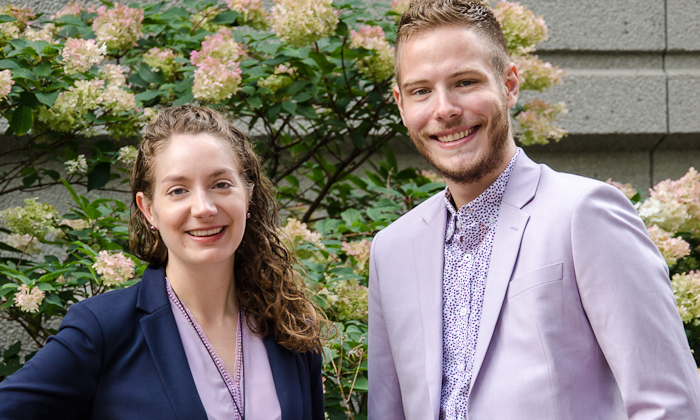L’équipe McGilloise remporte le IBFD International Tax Law Moot; Laura Davis et Jared Miller sont nommés coordonnateurs étudiants pour les initiatives autochtones; nos doctorants et doctorantes dans la presse avec des articles sur les valeurs de la Chartre des droits et libertés, sur les droits de la personne et l’intelligence artificielle, sur la laïcité et les symboles religieux, sur les enjeux éthiques des réformes fiscales internationales et sur l’accueil de réfugiés au Canada; une étudiante au BCL/LLB jette un regard actuel sur la criminalisation de la non-divulgation du VIH et un étudiant au BCL/LLB plaide pour une conscientisation plus efficace des parents au sujet des dangers de la non-vaccination des enfants.
Soutien supplémentaire pour les initiatives autochtones à la Faculté

Cet automne, la Faculté a eu le plaisir d’annoncer que Laura Davis et Jared Miller, candidats au BCL/LLB, ont été embauchés pour aider à soutenir les initiatives autochtones à la Faculté de droit. Laura et Jared chercheront à établir des partenariats avec les communautés et les organisations autochtones, à rencontrer divers intervenants pour déterminer les besoins des étudiants autochtones à la Faculté et à développer davantage le Programme de sensibilisation L.E.X. pour rejoindre la jeunesse autochtone.
McGill wins IBFD International Tax Law Moot in Amsterdam

Our sincere congratulations to Ellen Yifan Chen, Rachel Meland, Mariana Peres Toledo and Alin Potra won first place at the IBFD International Tax Law Moot in Amsterdam! The team won against 25 other teams representing 25 countries, each tasked with answering a question about the existence of a hidden model in their countries’ tax treaties. They were coached by Robert Raizenne, BCL’80, adjunct professor at the Faculty, and Professor Allison Christians, H. Heward Stikeman Chair in the Law of Taxation.
In the News
The Charter of Rights and Freedoms — and values?
Brian Bird, DCL candidate, Policy Options, 9 November 2018
“Canadians often refer to their Charter rights and freedoms, but not as much to their Charter values. In recent years, though, Charter values have gained traction in Canadian law. They now play a key role in how the Charter is understood — but there is reason for concern,” DCL candidate Brian Bird writes. “Criticism of Charter values is intensifying among lawyers, professors and judges. These values are not found in the Charter, which refers only to rights and freedoms. This means it is up to courts and administrative decision-makers to identify Charter values and define them.”
Keep reading…
The Criminalization of HIV Non-Disclosure: A Closer Look at the Duty to Disclose
Annelise Harnanan, BCL/LLB student, McGill Journal of Law and Health, 8 November 2018
“In Canada, failing to disclose a positive HIV status may lead to charges for various offences – most notably aggravated sexual assault and aggravated assault. Two landmark Supreme Court of Canada cases have described the circumstances under which an individual with HIV may be prosecuted for not disclosing their status: R v Cuerrier and R v Mabior. However, the criminalization of non-disclosure of HIV status has been widely criticized by experts in various fields, such as the domains of science and public health.”
Keep reading…
Human Rights without humans: The final line between artificial and superhuman intelligences
Jose Mauricio Gaona, DCL candidate, The Hill, 27 October 2018
“Human intelligence precedes civilization; artificial and superhuman intelligences, however, will redefine it. Current research in artificial general intelligence (AGI) and intelligence enhancement (IE) seek to remove human error from their most ambitious technological quests,” DCL candidate Jose Mauricio Gaona writes in The Hill. “If we develop a conscious artificial being or a super-intelligent human being, what rights then prevail: human rights, artificial- or superhuman- rights?” he asks.
Keep reading…
Choisir les symboles ou l’être humain?
Anne Iavarone-Turcotte, candidate au DCL, La Presse+, 19 octobre 2018
La doctorante Anne Iavarone-Turcotte réagit à la promesse du gouvernement Legault d’interdire le port de signes religieux par les employés de l’État en position d’autorité. « Certes, les symboles sont importants. Mais à quel point ? J’aimerais rappeler aux personnes séduites par cette logique un fait tout simple : sous les “signes religieux ostentatoires”, derrière les “postes qui incarnent le pouvoir coercitif de l’État”, au-delà de l’objectif symbolique d’assurer l’ “apparence de neutralité” de l’État, il y a des personnes. De vraies personnes à qui l’on refuse de vrais emplois au nom du message que le contraire enverrait », écrit-elle.
Poursuivre la lecture…
Tax Competition and the Ethics of Burden Sharing
Ivan Ozai, DCL candidate, Fordham International Law Journal, 24 September 2018
“Tax scholars have long suggested that tax competition should be mitigated because it reduces the collective revenues of countries, impairs their ability to redistribute wealth, and produces more regressive tax systems. Likewise, international organizations such as the OECD and the European Union increasingly move towards designing a global framework aimed at reducing tax avoidance and mitigating tax competition. However, there is no comprehensive discussion on the costs that would arise from institutional reform designed to tackle tax competition.”
Keep reading…
The UN Refugee Agency’s report shows that Canada should welcome more refugees
Didem Doğar, DCL candidate, CARFM Blog, 19 September 2018
A recent report by the United Nations High Commissioner for Refugees on forced displacement indicated that despite their limited economic resources, developing countries mostly and by far welcomed the greatest number of refugees. Meanwhile, Canada was ranked the 31st largest refugee-hosting country, and 9th in the developed world. “What does all this tell us?” Dodem Doğar asks. “Resettling more refugees to Canada is not only a moral duty but also necessity.”
Keep reading…
The dangers of not vaccinating are horrifying and graphic. Government warnings must show that
Jason Chung, BCL/LLB student, CBC News, 18 September 2018
“Back in April, the Canadian government announced a national awareness campaign and earmarked almost $3.4 million in additional funding to increase Canadian vaccination rates – a significant supplement to the $18 million it already spends annually on immunization initiatives […] But if raising vaccination rates is a priority, and the dangers of not vaccinating are so pronounced, why are the government’s immunization campaigns so milquetoast and flaccid?”
Keep reading…
